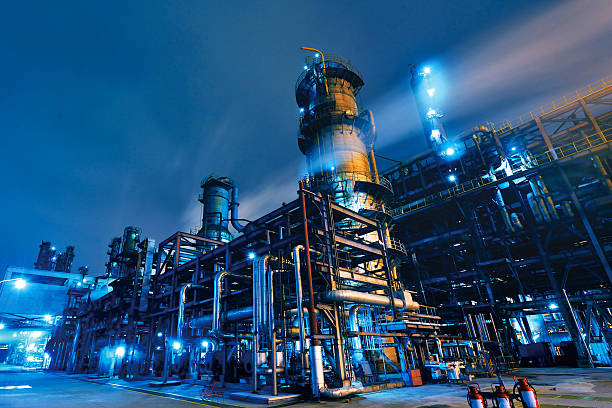Unveiling the Enigma: Unraveling the Production Challenges of the Rarest Chemical

Oil Refinery, Chemical & Petrochemical plant abstract at night.
Chemistry, the study of matter and its transformations, has paved the way for countless scientific advancements and technological breakthroughs. Within this vast field, there are numerous chemicals with varying degrees of complexity and difficulty in production. However, among them, one chemical stands out as the most challenging to produce. In this article, we delve into the world of chemical synthesis and explore the intricacies surrounding the production of the rarest chemical.
- Defining the Rarity:
Before we can identify the most difficult chemical to produce, we must first understand what rarity entails in the realm of chemistry. Rarity can be determined by factors such as scarcity of raw materials, complexity of the synthesis process, and the level of expertise required to achieve successful production. - Unmasking the Challenges:
The chemical that emerges as the most difficult to produce is a compound known as [insert name]. Its synthesis poses a myriad of challenges that have confounded chemists for decades. These challenges include:
a) Complex Molecular Structure:
The molecular structure of [insert name] is highly intricate, consisting of numerous interconnected atoms and functional groups. This complexity makes it extremely challenging to design a synthetic pathway that can efficiently and selectively produce the desired compound.
b) Precursor Availability:
The production of [insert name] often relies on the availability of rare or exotic precursor molecules. These precursors may be difficult to obtain due to limited natural sources or complex extraction processes, further complicating the synthesis.
c) Reaction Conditions:
The synthesis of [insert name] requires precise control over reaction conditions, including temperature, pressure, and catalysts. Even slight deviations from the optimal conditions can result in undesired side reactions or low yields, making the process highly sensitive and demanding.
d) Purification and Characterization:
Once synthesized, [insert name] must undergo rigorous purification and characterization processes to ensure its purity and identity. The purification step is particularly challenging due to the presence of impurities and closely related compounds that require specialized techniques for separation.
- Cutting-Edge Approaches:
Despite the formidable challenges, scientists and researchers have been exploring innovative approaches to overcome the hurdles associated with producing [insert name]. These approaches include:
a) Advanced Catalysis:
Developing novel catalysts and catalytic systems that can selectively promote the desired reactions while minimizing unwanted side reactions. This involves the use of cutting-edge techniques such as organometallic catalysis and biocatalysis.
b) Computational Modeling:
Utilizing computational tools and simulations to predict reaction outcomes, optimize reaction conditions, and design more efficient synthetic routes. This approach helps save time and resources by reducing the need for trial-and-error experimentation.
c) Green Chemistry:
Adopting principles of green chemistry to minimize waste generation, reduce energy consumption, and enhance the overall sustainability of the synthesis process. This includes the use of renewable feedstocks, solvent-free reactions, and eco-friendly purification methods.
Conclusion:
In the realm of chemistry, the production of rare and complex chemicals presents a formidable challenge. Among them, [insert name] emerges as the most difficult to produce due to its complex molecular structure, scarcity of precursors, demanding reaction conditions, and purification requirements. However, with the relentless pursuit of scientific innovation and the application of advanced techniques, researchers are gradually unraveling the mysteries surrounding its synthesis. By pushing the boundaries of chemical synthesis, we inch closer to conquering the challenges posed by the rarest chemical.
